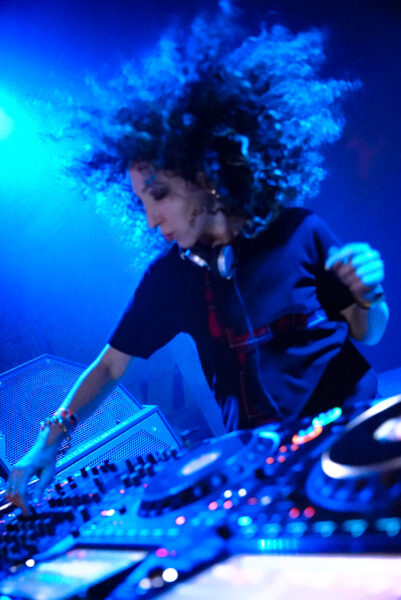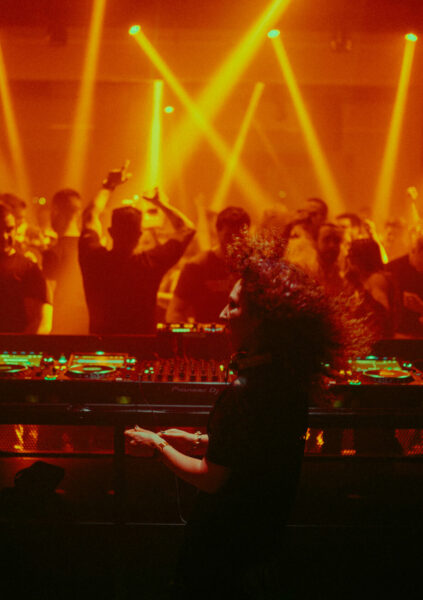We caught up with Hilit Kolet from Shanghai to talk about her musical history as she prepares to make the journey to Jaeger’s sauna again.
Hilit Kolet is a rarefied talent for these times. She has all the credentials: A job at an iconic record store; a classically trained background; legitimate studio experience; a knack for crafting dance floor cuts; and a sincere appreciation for the music above all else. She’s been celebrated by the radio jocks; lauded by her peers; played in some of the most influential spots; and remixed some of the best there is, yet her approach comes from a unique sincerity that is at odds with current trends.
Her musical output is considered and her style as a DJ bristles with that eclectic attitude that only a record store employee has. She’s already established a reputation as a DJ’s DJ, built on the foundation of an avid music collector and enthusiast, born from her days behind the counter at London’s Black Market Records. Hers is a diverse collection of musical touchstones, coalescing around the expansive House and Techno music universe and when it comes to a dance floor, there are few who know it better.
Her breakout single “Techno Disco” via Defected topped all kinds of charts with successive releases only re-affirming her abilities and her sonic diversity. She’s remixed and been remixed by the likes of Terry Farley and Mike Dunn and her edits, like that of Laurient Garnier’s “Crispy Bacon,” lives in infamy alongside its predecessors.
While the piano provided the springboard for her musical education it’s the records that have provided the most significant impetus for Hilit’s musical adventures and as such there is only one place she appears most at home; the DJ booth.
Last year, we had the pleasure of meeting Hilit for the first time and after a session for Øya Natt, we’re pleased to have the UK DJ and producer back at Jaeger. Hilit Kolet arrives on the Sunkissed ticket this Saturday and we took the opportunity to probe the DJ and artist more about her interesting background and some of what is on the horizon for the artist. We find her in Shanghai on the eve of the release of her remix of Why We Dance for Terry Farley & Wade Teo.
Hello Hilit. It’s a pleasure to meet you. Tell us where you are at the moment and what you’re listening to?
Hey, nice to meet you too. I’m currently in my hotel room in Shanghai having played last night. I’m listening to a new remix I’ve been working on, which is coming out early 2024, and also to a new beat I’ve started on the plane. It’s slightly different to what I’ve been making lately and I’m thinking it could make a nice collab with a vocalist I’ve been chatting to. Or I might just delete it and start a new idea, dunno.
I read that you were still doing piano recitals by the time you started getting into electronic music and DJing. What was the main catalyst in terms of artists, tracks, albums or genres as you switched over?
Yes that’s right. My mum was working as a piano teacher all through my childhood, she was teaching children on our beautiful grand piano, which took up most of the sitting room… I spent all my afternoons on the sofa watching the lessons, and when I was about five, I started becoming somewhat of a disturbance, telling students to ‘go home because it’s my turn to play the piano with mummy now’ hehe. I ended up training at the local conservatoire, doing the full thing, 4 times per week, including recitals and playing with the orchestra and all. I discovered electronic music at around 12 or 13 years old, back then I was listening to early Kenny Dope, Cajmere, Marshal Jefferson, Deee-Lite, Xpress 2, Yello, Steve Pointdexter, Leftfield – Leftism, Laurent Garnier, Robert Hood, Todd Terry’s sax album, Chemical Brothers, Daft Punk – Homework, Pet Shop Boys, Yazoo, Basement Jaxx, a real mix.
It took me a few years to completely ‘cross over’ but at one point I did. Classical music was a great way of processing pain and challenging emotions, but it was mostly about a heavier spectrum of feelings. Now, I discovered that music was also a way to express joy and passion and excitement, and it was really refreshing and somewhat liberating too.
How does that early musical education influence what you do today and what was the main challenge in going from traditional musical training to electronic music intended for the club?
That’s always been an interesting subject for me, because I think that in many ways, having had a traditional, classical music background was counter-productive when I first started experimenting with music production. With DJing it was very helpful for sure – all those music theory and music literature lessons I took as a kid have trained my ears really well, and it made mixing intuitive and easy, but producing my own music felt different: it was too ‘sacred’ almost.
It took me a while to work out that this was a direct repercussion of the strict Eastern-Europe mindset they had at my conservatoire: sheet music only, Chopin, Debussy, Schubert, Beethoven, memorising your chords, learn 26 pages all by heart. The teacher nearly fainted when I asked if I could try some jazz or improvise a little for a change…
And of course, producing music, especially electronic music, takes a lot of improvising and a ton of letting go – of music theory and of all other “rules” too. I do feel like I’ve come out the other end though. I’ve taught myself to give in to “happy accidents” as oftentimes they make the best bits. Plus, life is messy anyway right, so art should only follow suit.
You spent some time working at Black Market too. Besides being surrounded by that kind of music all day, what did you take away from that experience?
Working in the shop exposed me to musical scenes that were not on my radar at all, like dubstep and drum & bass – two genres the shop played a pivotal part in nurturing – and while they’re still not my go to’s, looking back it was certainly nourishing for my overall musical diet, and it was also a good exercise in keeping an open mind musically. I do think that as a DJ and a selector, it’s important to develop a sonic identity, or a ‘sound’, but it’s also important to remain curious musically and to try and break out of your own echo-chamber.
How has your taste evolved during and after your stint there and are there any records from that time you refuse to ever part with?
Well I was working there over a long period of time, 7-8 years, so ultimately my taste would have changed a lot during that phase anyway, but one thing I do know is that my understanding, my ability to map the underground dance music landscape, labels, artists, scenes and how they brewed, was nothing comparable before and after. Records from my time at the shop that I will never part with – there’s so many as I’m not parting with any of my records hehe, but here are a few: Mr. G – Space Bassed, Cassius – Youth, Speed, Trouble, Cigarettes (Radio Slave Remix), Rolando – The Afterlife, Theo Parrish – Falling Up (Carl Craig Remix), Alden Tyrell – Touch the Sky (which actually features MD on the vocals), John Tejada – Now We’re Here on Kompakt, Luke Solomon – Space Invaders (Andomat 3000 Remix) on Rekids, Jon Cutler feat. E-man- It’s Yours and so many others.
Were you DJing before Black Market?
Not really, not professionally anyway. I was always collecting records and I was really into radio. I was 12 when I decided I was going to be a radio DJ and a music journalist, mainly so that I could get my hands on promo copies, and later on because I wanted to help others discover the music that I felt (and still feel, most of the time) was saving my life. So that’s what I did, while exploring and studying both electronic music and clubbing as cultures. It was very obvious that it was my ‘thing’ in life, but for some reason DJing in clubs was never something I had on my list.
It was only when offers to DJ came in while I was working at Black Market that I thought, “well maybe I should give it a try, after all, I always go out hoping to hear the records I discovered this week, I always think to myself, mmm I would play this record with that record…”. Literally everyone around me was like – “thank you! Finally!” and I felt really odd and a little silly that it made so much sense to them, but never even crossed my own mind.
What was it about DJing that first intrigued you and what does it mean for you in terms of a creative outlet that you wouldn’t necessarily get from producing and/or playing the piano?
It’s an obsession. If I’m into a track, I have to hear it again and again, and the only way to get it out of my system is to listen to it on a really big rig, a few times, and dance to it…. Ha. I think it’s the same for most DJs? I can only guess. I’m limited doing that at home (even my daughter tells me off!) so it’s kind of a necessity.
DJing has always been this fleeting thing, subject to contemporary tastes and impulses. What remains sonically consistent in your DJ mixes for you?
Lately I find that I need equal measures of groove and drive in a track for me to get into it. I can’t have all groove or all drive. A funk injection is good, also a touch of sex appeal. I also like my music raw, or with a raw feeling if you know what I mean. Yes I go through a lottttttt of tracks before I find something I dig.
I believe you have some experience working in a studio too. Is there something to working in that environment that changes the way you approach the creative aspects of making music?
Yes, I owned a high-end recording studio with my ex-husband for nearly a decade and that’s where I also picked up production. It was stuff of the dreams, a 64-channel Neve desk, one of the largest synth libraries in the world, all of the plugins you can possibly think up, same for sample libraries, and it was so much fun, but it was also really distractive.
These days I’m mostly in the box in my smallish but cuteish home studio, with the odd 909 or SH-101 thrown in, but I get ideas down much quicker this way – and isn’t music mostly about ideas – as is all art?
I mean, you can’t make a bad idea better just by using the latest plugin, and it’s also not about the number of analogue synths you’ve invested an arm in, or how many channels you crammed your project with… It’s about having a vision and a certain feeling you want to put across, or at least that’s how I see it.
Your next record, ‘Hot Mess’ will be coming out next year and I had the pleasure of hearing the tracks. What were some of the ideas behind that record, and how it came together on Rekids?
Oh you have, I’m glad to hear this. The starting point for ‘Hot Mess’ was the decision not to use any loops, so it’s a 100% programmed drum machine werqqqout. I made the first version of the track on a pretty intense day and I remember thinking, wouldn’t it be great if I somehow managed to capture how I was feeling at that point AND get rid of it at the same time… Very quickly I had this relentless groove going, and I then felt it needed a raw, emotional vocal to give it contrast. It took quite a few versions before it was finished. I was working with the vocalist remotely over a few sessions and playing about with arrangement and mixdowns quite a bit because I’m a bloody annoying perfectionist, but I think it was worth it. When Matt Edwards said he wanted it for Rekids I couldn’t be happier. I’ve been following Rekids since day one and absolutely adore everything they do.
And Mike Dunn is on the remixes and brought some of that Chicago flavour to it. What’s your relationship with Mike and what were your first impressions of the remix?
I met Mike at a festival in Croatia a couple of years ago. I think by now you’ve probably realised I’m a massive Chicago house fan and of course, I’ve been collecting and playing Mike’s music forever, so to have him remix my music is simply incredible. I love the deep groove spin he put on ‘Hot Mess’, it’s so different to my original and I think that’s exactly what makes a remix interesting.
I guess edits and remixes like this next one for Terry Farley and that infamous Laurient Garnier edit keeps you busy too. How do you usually approach these tracks, especially when you’re handling a legend like Terry Farley’s work?
Edits and remixes are two very different creatures as far as I’m concerned. I’ve done quite a few edits over the past couple of years of ‘classic bangers’ (as I like to call them) that I wanted to play out but felt needed an updated finish, both in terms of sound as well as arrangement. I’d try and pay respect to the original while put a little spin on it, but mostly I’d just aim to make a modern version of the original that sits well within my DJ sets. That’s what I tried to do with Laurent Garnier’s techno anthem ‘Crispy Bacon’; Laurent loved it and played it and so did Carl Cox, Patrick Topping and others. It still amazes me that Laurent then decided to release it on his new album’s limited edition boxset… What an honour.
When it comes to remixes, I think they could potentially hold more room for creative freedom, so that a release package offers the remix as a different flavour to the original. With those, I would try to find a hook or a few hooks that really clicks with me, sometimes use another distinctive sound off the original, and mostly have my own drums and sounds on top. That’s what I’ve done with my remix of Terry Farley & Wade Teo’s track, which is out this weekend on Rekids. And yes Terry is a total legend and a bit of house dad and mentor to me, which I’m super grateful for.
A lot of energy in that one. I assume playing a track you’ve made out is never too far from your mind when producing music?
Absolutely, I first and foremost produce music I want to be playing in my own sets, it’s how I got started with producing.
There are a few of your contemporaries that have capitulated to the 3 min track to appease the Spotify algorithm, but both this remix and Hot Mess are well over 5 min. What are your thoughts on dance music producers following that trend and where do you draw the line in your own music in terms of appeasing an audience?
The 3 minute edit is usually an additional version a label would ask the producer to cut, with radio and streaming in mind. It’s something I can understand from a business point of view but having to butcher an arrangement you’ve tweaked again and again for the dancefloor is far from fun… Which is why it’s a relief that labels like Rekids don’t ask for these versions.
You’ve said in the past it’s all about the crowd and the night for you. This will be your second visit to Jaeger. Any idea how this night will go?
I’m looking forward to it so much! I absolutely loved visiting and playing Jaeger last year, I was so impressed with everything about it, from the amazing system to the acoustic treatment of the room to the oak smell to the double-headed mixer to the crowd and of course with Ola and the team. This time I’m back with a ton of new music I’ve made over the past few months, including a couple of brand new tracks I’ve not played out at all yet, so I can’t wait.
And lastly, can you play us out with a song to set the mood?
Of course, here’s my new remix of Terry Farley & Wade Teo feat. Kameelah Waheed ‘Why We Dance’, which is out on Rekids this weekend:





